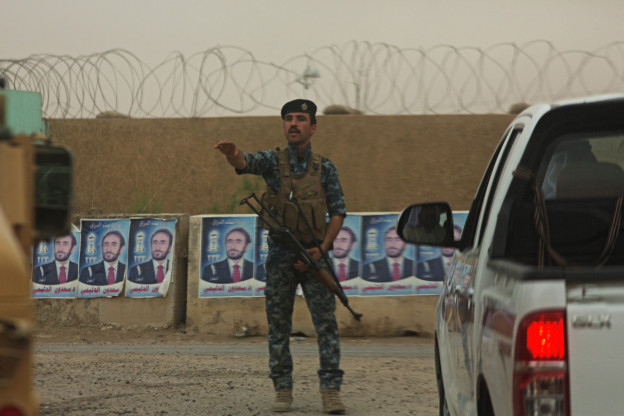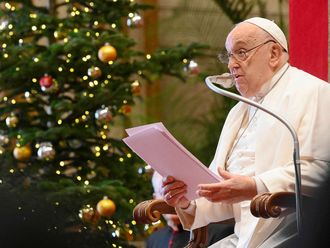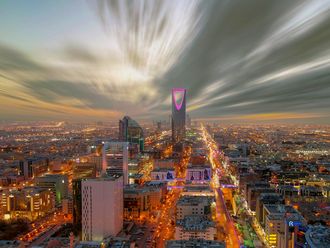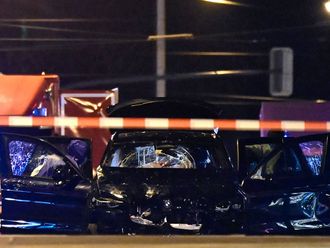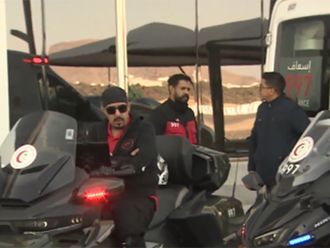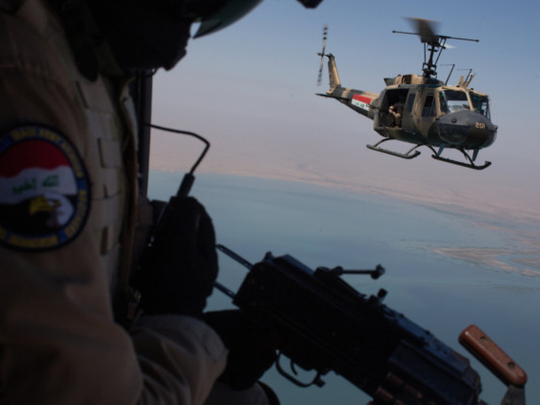
Iraq’s acting defence minister looks beleaguered, his face drawn, with deep bags below his eyes from a lack of sleep.
For four months, Sadoun Al Dulaimi has been operating from Anbar, the most dangerous province for US soldiers during the Iraq War and one again riven by conflict.
The army has dispatched 42,000 troops here in a bid to quell Al Qaida-inspired jihadists and hostile tribesmen, whose resurgence is posing the biggest test for the Iraqi military and the country’s Shiite-led government since the withdrawal of US forces two and a half years ago.
The battle is filled with potential pitfalls. A government failure to regain control in Sunni-dominated Anbar would jeopardise the country’s unity. But an escalated military offensive could deepen anger among the nation’s Sunni minority, fanning the flames of sectarian war.
The fight has proved tougher than expected. Hundreds of soldiers have died, and the military is facing mass desertions. The government says it is incapable of stemming the flow of hardened militants, who are often better equipped than Iraqi forces, across the border from Syria.
Even Dulaimi has found himself in the line of fire at his temporary headquarters in one of ousted president Saddam Hussain’s former palaces, now an army compound on the banks of the azure Euphrates River. The roof of his office sags where a mortar round hit two weeks ago. Another struck a car outside a few days later. His helicopter has been fired on twice, and once a sniper shot through his window as he slept.
The city of Fallujah, 48 kilometres east towards Baghdad, remains completely out of government control after being overrun in January by militants from the Islamic State of Iraq and Syria (Isis), an Al Qaida offshoot, and anti-government tribesmen.
Ramadi, the provincial capital, has largely been subdued, but a steady barrage of artillery thunders out from the main army base in the city, and several neighbourhoods have yet to be secured. The flashes of explosions intermittently light up the city’s outskirts.
“War has destroyed this country since 1980,” Dulaimi said, referring to the beginning of the Iran-Iraq War. “Again, we are in the middle of a war. It’s war. This time we are fighting against ourselves, unfortunately.”
Like the United States before it, the Iraqi government has been attempting to recruit Sunni tribesmen to help in the fight. Dulaimi, who hails from Anbar’s largest tribe, spends much of his time negotiating with tribal leaders. He is also Iraq’s culture minister and has a doctorate in psychology, and he acknowledges that he prefers “the academic life”. But for now, his life is consumed by the conflict.
“It’s one of the shaikhs,” he said, apologising as he took a phone call on a recent evening. “We are trying to be nice to the shaikhs, because we are supposed to be fighting shoulder to shoulder.”
Iraq’s Shiite prime minister, Nouri Al Maliki, has been accused of deepening Iraq’s sectarian divide by isolating the country’s minority Sunnis. His party won the most seats in last month’s parliamentary election, raising fears about what a third four-year term under his governance will mean for this province.
But like other government officials, Dulaimi, a Sunni, blames the conflict on outside influences such as the war in neighbouring Syria, now entering its fourth year.
Military commanders say Syria has only added to Anbar’s woes. Iraq is incapable of controlling its border, and every week 40 to 60 cars packed with Isis fighters rumble across the frontier, according to the commander of Anbar operations, Lieutenant-General Rasheed Fleih. Helicopters armed with US-supplied Hellfire missiles can take out only two cars at a time, and convoys often travel during inclement weather to hide their movements.
Fleih called on the United States to provide promised F-16 fighter jets and Apache helicopters, saying that Washington should “counterbalance” its arming of Syrian rebels by helping Iraq stop the weapons in Syria from spilling across the border.
As it is, the Iraqi Army is struggling, he conceded.
The army never got back on its feet after being dismantled following the 2003 invasion, despite extensive US training, he said. Many Isis militants, meanwhile, have spent years fighting in Syria and Yemen, and among them are well-trained snipers and bomb-makers, Fleih said — as well as a growing number of foreign fighters from Europe, Chechnya and North Africa.
Iraqi soldiers are often outgunned by the insurgents, who are equipped with advanced weaponry such as shoulder-launched antitank rockets, he said.
“The Iraqi Army hasn’t seen a challenge of this magnitude since 2003,” Fleih said.
As violence rages in Anbar, Albu Faraj, an area just north of Ramadi, is considered one of the government’s success stories. Its homes are scorched or flattened, their bullet-pocked walls showing the scars of the army’s recent offensive to oust insurgents. It could be a scene from a decade ago, when the US battled Al Qaida here. In just one day in 2005, US troops killed about 50 insurgents in the neighbourhood.
Shaikh Abdullah Jallal Al Faraji fought alongside the Americans then, and his body bears the scars of machine-gun fire from bouts with Al Qaida in the years since, including a deep gouge from a bullet in his right hand.
This year, clashes once again broke out in Albu Faraj, an area sliced in two by one of the main highways into Ramadi. The tribal leader on the western side of the road was sympathetic to Isis, while tribesmen to its east, including Al Faraji, backed the government.
Isis had been building its presence here over the past year, Al Faraji said. Sunni disillusionment with the Shiite-led government, which manifested itself in mass demonstrations and a protest camp a few kilometres up the road, helped fan the flames.
“There was a mistake from the state in not listening to the protesters,” Al Faraji said.
Since the beginning of the year, fighters on the western side had attacked army convoys using the highway to enter Ramadi. In February, the fighters tried to push into the eastern side. Al Faraji said his followers battled them for three days until the army intervened and launched an offensive. He lost cousins and a nephew.
About 75 houses were destroyed — most booby-trapped with explosives that killed many soldiers, according to Al Faraji. Iraqi officials declined to comment on how many troops died trying to secure Albu Faraj.
One day after last month’s parliamentary elections, the western side of the highway remained tense. Army snipers peered over rooftops. A few signs of everyday life, such as boys playing soccer, had returned, but much of the area appeared deserted.
The soldiers did not want to linger.
“Before, this area was all very hot,” said Brigadier-General Hesham Fayath, a spokesman for the army’s military operations here. “Now it is secure, but we should move quickly.”
Travelling in the front seat of an armoured Humvee, the general brushed off questions about a thick black plume of smoke to the south. It would turn out to be a suicide bombing at an army checkpoint that killed two soldiers. The general’s own house in Ramadi had been blown up a week earlier.
Government officials have been accused of suppressing figures on the deaths of soldiers in Anbar this year. Dulaimi said only that “tens” of security-force members, including the police, have been killed.
But Fleih, whose office occupies another palatial building on the Ramadi base, said that more than 300 soldiers have died in the province this year and more than 1,000 have been injured. There have also been large-scale defections since the Anbar conflict began, he said.
But the army has attracted a steady flow of new recruits and does not mourn those who have left, he said.
“It filters out who is courageous and who is cowardly,” Fleih said.
For many in Anbar, the return of war has been painful. Ahmad Khalaf Al Dulaimi, the governor of Ramadi, said the central government’s biggest mistake was to not renew an agreement that would have allowed a continued US troop presence after 2011. Instead, he said, the work of the US has unravelled.
“Now if we were to return back to 2004, we’d be in a better situation,” the governor said, because at least then there was hope and a plan.
Today, the question of how the state will regain control of Fallujah looms large.
On an operational planning board on the army base, red arrows point to the city where fighting claimed the lives of nearly 100 US Marines. Military plans are in place, but they were delayed because of the election, said Sadoun Al Dulaimi, the acting defence minister.
Fleih said his men are ready and have been trained for the “entrance operation”. They are just waiting for the command from Maliki.
“We have plans and back-up plans,” he said. But he couched that assurance with a warning: “In spite of that, we will have civilian casualties.”
The acting defence minister did not disagree.
“When you fight for your country, for your freedom, for your rights, and you have no choice, you shouldn’t be concerned” about casualties, Dulaimi said. “Just go ahead.”
–Washington Post


